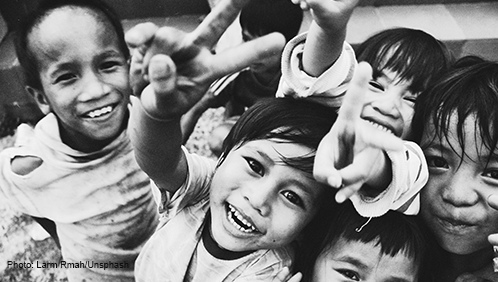New IPC-IG and UNICEF study maps social protection programmes in Asia and the Pacific
All programme profiles in this study will be made available online through the socialprotection.org platform

By Denise Marinho dos Santos, Communications Officer
Brasília, 14 February 2019 – In recent decades, social protection has been at the top of the global development agenda as a policy instrument to curb poverty in developing countries. Social protection systems have been included as a target under Sustainable Development Goal 1: “End poverty in all its forms everywhere”. However, reliable information about programmes implemented in developing countries can be difficult to find, fragmented or inaccessible.
Seeking to bridge this information gap, research teams from the IPC-IG and the UNICEF Country Offices in Asia and the Pacific have pooled together their expertise to produce the “Social Protection in Asia and the Pacific: Inventory of non-contributory programmes”, an overview of social protection programmes currently being implemented in 19 low and middle-income countries of the East and South Asia region1 and 11 countries in the Pacific Islands2. In total, 215 programmes were mapped in 30 countries, of which 141 have been profiled. The selected programmes included fully or partially financed schemes, designed or implemented by governments, and for which there was information available.
During the preparation the study, some trends were identified. First, most programmes were implemented in the mid-1990s, with children being among the main target beneficiary groups. Unconditional and conditional cash transfers are the most common types of programmes; however, educational fee waivers, school feeding programmes, unconditional in-kind transfers, and fuel and electricity subsidies are also implemented.
Presented in tables depicting key information, all programme profiles in this study will be made available online through the socialprotection.org platform. The inventory was based on a comprehensive literature review, complemented by consultations with local focal points, including UNICEF Country Offices and government representatives, with the support of the Australian Department of Foreign Affairs and trade (DFAT).
Related readings:
- Policy in Focus magazine "Social Protection: meeting children's rights and needs".
- Report “Children’s Right to Social Protection in the Middle East and North Africa (MENA) Region—an Analysis of Legal Frameworks from a Child Rights Perspective”
- Report "Overview of non-contributory social protection programmes in the Middle East and North Africa (MENA) region though a child and equity lens'
- One Pager Series: "Overview of non-contributory social protection programmes in the Middle East and North Africa (MENA) region though a child and equity lens" in Algeria, Bahrain, Djibouti, Egypt, Iran, Iraq, Jordan, Kuwait, Lebanon, Libya, Morocco, Oman, Palestine, Qatar, Saudi Arabia, Sudan, Syria, Tunisia, Yemen and United Arab Emirates. Find them all here, sorted by language: Arabic, English, French and Portuguese.
(1) Afghanistan, Bangladesh, Bhutan, Cambodia, China, East Timor, India, Indonesia, Laos, Malaysia, Maldives, Mongolia, Myanmar, Nepal, Pakistan, Philippines, Sri Lanka, Thailand, and Viet Nam. (2) Cook Islands, Fiji, Kiribati, Nauru, Niue, Paulau, Samoa, Salomon Islands, Tonga, Tuvalu and Vanuatu.